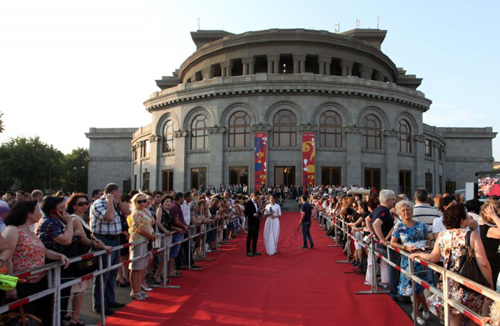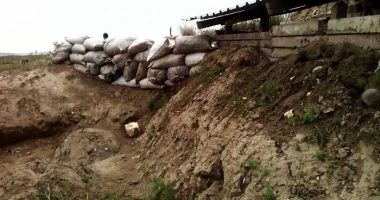By Dikran Safarian
August 20, 2018. I’m boarding my flight from Astana, Kazakhstan to Moscow, and then on to Yerevan. I’m nervous.
It is my 2nd visit to Armenia this month, but this is an unscheduled visit. I was in Armenia just last month, visiting my aunt, my mother’s sister. I left Armenia just 3 weeks ago and continued traveling east, planning to eventually reach my hometown of San Francisco. I should be in Mongolia now, or South Korea, but instead I am back in Armenia. A few weeks ago, I received a message, and then a phone call, and everything turned upside down.
July 2018. I am visiting my aunt in Armenia for the 4th time in my life. I had first visited Armenia in 1983, and then in 1999, in 2016, and now in 2018. As usual, my aunt takes me in with open arms. Of course, we eat, we laugh, we look at old photographs, black and white, of my youthful mom before she got married, and of their siblings – 2 other sisters, and a brother. She tells me stories I haven’t heard before, of her parents, of the brutal slaughter of her grandparents during the time of the Armenian Genocide of 1915. Stories of migrating from Turkey to Syria in the mid-1920s to escape the genocide. Stories of migrating from Damascus to Yerevan in 1947 to repatriate the country, her father dying in 1949, and many other stories I have never heard before and decide to document so I would never forget.
I am thrilled to have a strong bond with my mom’s side of the family. But what about the family from my dad’s side? My father passed away in 2012 in Los Angeles, where I was born. My father’s brother died in Armenia in 1989. He had 3 sons. 1 of them died in 2001. I heard a rumor that another one of them had died. So that must mean that at least one of them is still alive. All 3 brothers have children and grandchildren. We had been in touch with them through my father while he was alive, through the letters and pictures back and forth between Yerevan and our home in Los Angeles. After dad died, I took all the photos he had left behind. But the envelopes and letters – I don’t know what happened to them. Certainly my relatives must be living in the small capital city of Yerevan. They might even be walking distance from the Yerevan apartment I’ve rented for the week. I am sure they live in Yerevan, but I don’t know how to find them.
Over the years, I had searched their names on the internet but was frustrated with too many vague search results. I wrote many emails to strangers on Facebook, who shared the same names of my relatives. I had asked them if they were my lost relative if they had family members that matched the names I gave them, etc. They had all either ignored me or told me that I was in touch with the wrong person. I had asked everyone I met in Yerevan how I could find them, and they just suggested things I’d already tried.
In my apartment in the vibrant city center of Yerevan, I spend the night thinking about my dad’s family. Laying in bed, the light bulb goes off. I was thinking through the photos my dad had left behind. I remember the photo of my uncle’s gravesite. I remember I had visited the gravesite in 1999. It was a family grave site. Next to my uncle was the graves of his wife and his mother. If I could find the grave site, I could find the rest of the family.
Finding a gravesite in Armenia is no easy task. Unlike cemeteries in the USA, grave sites in Armenia are not well organized. There is no directory.
There is no smiling employee to greet you at the main entrance gate and offer you a map. I had visited the graves of my maternal grandparents, so I knew that trying to find another gravesite would be like trying to find a tiny needle in a massive haystack. Cemeteries in Armenia can be massive, a sea of graves that go on for miles. Not a single employee or directory to assist. If you don’t know the exact location, there’s little hope, and I knew this. But there was Google.
In the middle of the night, when that lightbulb goes off in my head, I can’t switch it off. I sit up in bed, turn on my laptop, and I search to see if there is someone to help me find a gravesite. Sure enough – there is a service in Armenia that specializes in arranging funerals. And they also specialize in caring for grave sites and helping loved ones locate grave sites. They charge a small fee for this service, but I am suspicious. Is this another dead end? Would my money wind up in a black hole? Having exhausted every resource, I give this a shot. I click the “Pay” button and go back to bed. I can hardly sleep, anxiously waiting to see if I would receive any kind of response.
8 AM the next day, I keep checking my email. Sure enough, just hours after I send the request, I receive a link with the GPS coordinates of the grave site. I am ecstatic! A second light bulb goes off in my head. Before I go to the cemetery, I will handwrite a letter so that I can attach it to the grave site. The letter will be written in both Armenian and in English. It will be addressed to any relative who would find the letter and connect me with my lost family. It will contain my intent – that I am looking for my lost relatives, written with a sense of urgency. It will contain all their names to the best of my knowledge. It will contain all my contact information.
Tuesday, July 31, 2018. I grab the letter and run out the door. I find a stationery store where I purchase an envelope and some packing tape. I hail down a taxi and ask the driver to take me to Shahoumyan cemetery in northwest Yerevan. I tell him that once we enter the cemetery, I will use my phone to locate the gravesite using the GPS coordinates provided to me by the funeral service, just less than an hour ago. The driver listens to the story of my lost relatives and finding the cemetery, as I can’t contain my anxiousness and excite. We drive through the main gate of the cemetery. I have my phone turned on ahead of time and I am tracking our location. Is this going to work, or am I being misled, I wondered? The taxi drives just a few meters and the blue dot on my GPS is getting closer and closer to my location. And then I am on the dot. The grave must be nearby. I look left, past the driver, and to my absolute astonishment, I see the face of my cousin. The one who had died in 2001. His picture is etched onto the grave. Next to him, his father – my uncle. And next to him, my uncle’s wife, and my paternal grandfather. And one more grave site – that of the 2nd of 3 brothers. I guess the rumor was true. He, too, had died. Surreal. Unbelievable. Is this truly happening?
The taxi driver is very kind to me. He helps me tape up the letter to one of the grave sites. We tape it very well in case of rain or snow.
I hope a family member will find the letter soon, hopefully before the rain and the snow arrive. I hope the letter won’t be removed by a cemetery employee or vandal. I cry. I have a lot to think about. If the family does find the letter, what will they think? Will they remember me? Will they embrace me, or will they write me off as a relative who has long abandoned them? Will they care enough to contact me?
On August 3, 2018, I leave Yerevan. I fly to Beirut to see the city where my father was born. My father had told us almost nothing about being born and growing up in Lebanon. I regretted not having asked him questions while he was still alive. Hindsight is 20/20, they say. Beirut has a large Armenian community due to the many Armenians who moved there after the genocide. The Armenian neighborhood is called Burj Hammoud, and I assume my father was born and raised there. I find a local friend in Beirut who shows me around Burj Hammoud. We have some Armenian food at a famous Armenian restaurant, and I hear many locals speaking Armenian in the local dialect we call Western Armenian, which is a bit different from the Eastern Armenian we speak in Armenia. After visiting Beirut, I continue my travels East, on to Kyrgyzstan, Kazakhstan, Tajikistan, and then I figure I would keep going East until I make it back home to San Francisco.
August 13. I arrive in Bishkek, the capital of Kyrgyzstan. The plane lands and I turn on my phone. My phone is blowing up. There are messages from people I don’t know, but their names sound familiar. They are the names of my relatives, from my father’s side, my uncles family. They have found the letter. At my hotel, I am overwhelmed. I haven’t given any thought to what I would say to them, in the unlikely event they find the letter. I don’t expect them to find it so quickly – less than 2 weeks after I leave it. I need a quiet moment to gather my thoughts. I think about my sisters back in the USA. Why had we not kept in touch with these people who were our flesh and blood? How could we let this happen? Are we to blame to having lost the connection? Had my dad known that we had lost touch with his brother’s family, he would be disappointed. Had he been alive to see what I was doing, he would be proud.
I call them back. “Hi,” I said “I got your voice mail. Can you tell me who are you?” “I am your cousin’s son. I share the same name as you.” Huh? There’s someone else who has the same name as me, I thought? “We found your letter,” he continues. “My stepmother found it.” She and my uncle’s wife went to visit the grave and brought the letter home. We couldn’t believe our eyes. We thought we had lost contact with you long ago. We never thought we would ever find you. We had lost hope.”
Next, I called my cousin. The only remaining of the 3 brothers. I had never met him in my life. Never heard his voice. Never seen his picture. But when I saw his face on the video call, when I heard his voice, I saw the image of my father. It was like my father was alive again, speaking through my newly found cousin. “Where are you now?” he asks. “I was in Armenia just 2 weeks ago, but I am now in Kyrgyzstan. After this, I will continue east to Mongolia, to South Korea, to Japan, and then back home to the USA.” “You must return to Armenia,” he says. “My dear cousin, what’s happening is beyond belief,” I respond. “No one will believe this story. It doesn’t matter. All that matters is that we have found each other, after a lifetime apart. But coming back to Armenia now isn’t possible. Maybe next year. Until then, we can stay in touch via facebook, skype, whatever.” “You must return to Armenia,” he says, repeatedly. “We must meet. We can’t wait any longer.”
August 20, 2018. I’m boarding my flight from Astana, Kazakhstan to Moscow, and then on to Yerevan. I’m nervous. I’m not really ready to meet him and his family, but I have to do this. It’s been just 3 weeks since that light bulb in my head changed my life. I hope this is the right decision. I hope this isn’t a mistake. There’s only one way to find out. I arrive in Yerevan. I am waiting for my luggage to come off the belt. Just a few feet away, on the other side of the customs door, is a throng of people waiting for their loved ones. One of them is my cousin. I’ve only heard his name through family discussions. My family last saw him in 1973. I wasn’t born yet. A 45-year gap. Now he has 3 kids and 6 grandchildren, plus another one on the way. I spot him immediately in the crowd. He looks like my father. We look like each other. He embraces me, we are holding each other. We are in disbelief.
Over the course of 4 nights, my cousin and his family board me in their 10th story apartment in Yerevan. My uncle, his father, used to live just below him, on the 9th floor. This is where my uncle lived and died. I’m not allowed to buy anything or do any kind of work or so much as lift a finger. My only orders are to relax, to eat delicious Armenian food, to relax, to connect. I meet his children and his grandchildren. There are endless celebrations, all triggered by a simple letter that has changed all our lives. We visit the plot of land where my father and mother and sisters used to live before leaving Armenia in 1974. It is now a farmer’s market. We visit the same cemetery I visited just 3 weeks ago. We bring flowers and incense. He tells me stories. I tell him stories. We have 45 years of life to catch up on. I have my family back. We are one again. My father would be proud.
Dikran Safarian is a first-generation Armenian born in Los Angeles, now living in San Francisco. Dikran holds a BA from UC Berkeley and an MBA from Arizona State University. As an IT consultant, Dikran is an avid business traveler and has visited over 80 countries.










